The views expressed in our content reflect individual perspectives and do not represent the authoritative views of the Baha'i Faith.
The last time I visited New York City, I took a walk down 57th Street and thought about racism.
If you stop in front of 118 W. 57th Street, you can do the same. In 1981, developers demolished one of New York City’s best-known and finest old hotels—the Great Northern—and built a new and much taller hotel, the Le Parker Meridian, on the site. Situated just a few feet away from Central Park, the Museum of Modern Art and Carnegie Hall on 57th Street, the Great Northern played a major role in early twentieth-century New York. The pioneering modern dancer Isadora Duncan and the American novelist William Saroyan once called the Great Northern home. Designed by the same architects who had drawn New York’s famed Grand Central Station, the Great Northern was renowned for beauty and luxury in its day. Now, though, people mainly remember the old Great Northern for an ugly racist incident that took place there prior to a Baha’i meeting in 1912.
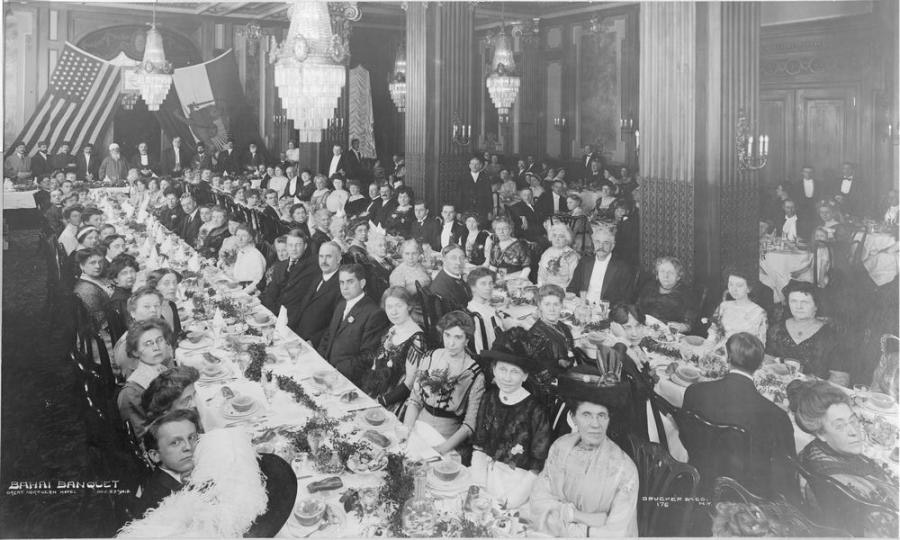
Abdu’l-Baha at banquet in the Great Northern Hotel in New York
On November 26, 1912, the New York City Baha’is planned to hold a gala banquet in the ballroom of the Great Northern Hotel to commemorate a Baha’i holy day known as the Day of the Covenant—which celebrates the ongoing unity of the global Baha’i community. In the last few days of his eight-month North American sojourn, Abdu’l-Baha—the son of Baha’u’llah, the prophet and founder of the Baha’i Faith—would attend. The New York Baha’is saw the event as a major milestone in the history of their Faith, especially since they would celebrate the Day of the Covenant in New York, which Abdu’l-Baha himself had named the “City of the Covenant.” Three hundred people were invited, and asked to dress up in formal attire. Carrying huge bouquets of flowers, they would enter a grand ballroom festooned with banners, ornaments, and the sparkle of electric lights reflected in crystal glassware. The entire Baha’i community looked forward with happy anticipation to the event.
But when the proprietor of the hotel learned that the Baha’i community included a large number of African American believers, he barred anyone with dark skin from entering. The white Baha’is tried very hard to persuade him to change his mind, but he vehemently refused. The Great Northern’s proprietor told them: “If the people see that one colored person has entered my hotel, no respectable person will ever set foot in it, and my business will go to the winds.”
The Baha’is, already committed to the hotel’s ballroom rental, reluctantly went ahead with the forcibly-segregated event. They realized that every hotel in Manhattan that could accommodate such a large crowd would likely bar black people, as well.
So Abdu’l-Baha spoke that night to a segregated, completely white gathering in the Great Northern’s ballroom. He gave an address about the oneness of humanity and the other Baha’i teachings, and then “encouraged all towards peace, harmony and sincere love for all the people of the world.” – Mahmud’s Diary, p. 406.
But that didn’t end it. What the New York Baha’is did at a meeting the next day to make up for that racist segregation tells us something profound about Baha’i principles, and about the Baha’i approach to healing racial hatred.
History doesn’t reveal how the next day’s meeting came about—whether Abdu’l-Baha suggested it, or whether the Baha’is themselves thought it up first. We do know that on the very next day, Sunday, November 24, at the Kinney home in Manhattan, the white Baha’is held a banquet for the African Americans who couldn’t attend the observance of the Day of the Covenant at the Great Northern Hotel. Not only did they hold a banquet, the white Baha’is decided to actually serve the black Baha’is—a powerful and even unheard-of symbolic gesture in those racially biased times. Here’s the description of what happened:
Since it was impossible to invite the black Baha’is to the banquet, the friends arranged today’s feast for their black brothers. Many white women came forward to serve their black guests, showering them with love… The meeting embodied the grandeur of the Covenant and demonstrated the power and influence of the Cause in uniting, in sincerity and love, two races of humanity. – Ibid., p. 407.
Abdu’l-Baha spoke to the assembled crowd that Sunday, saying:
Today you have carried out the laws of the Blessed Beauty [Baha’u’llah] and have truly acted according to the teachings of the Supreme Pen. Behold what an influence and effect the words of Baha’u’llah have had upon the hearts, that hating and shunning have been forgotten and that prejudices have been obliterated to such an extent that you arose to serve one another with great sincerity. – Ibid.
Recently, thinking about those events more than a hundred years ago, and also thinking about the killings of African American men by white policemen and white policemen by a deranged African American man, I began to wonder: what will it take to repair the racial divisions our societies continue to suffer from today?
I suspect that following the loving example of those early Baha’is might go a long way toward healing the racism that still plagues our cultures now.


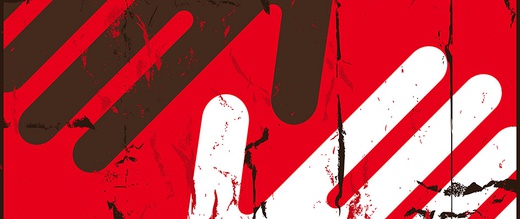




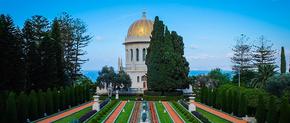
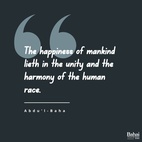
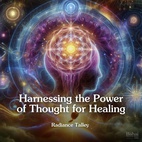

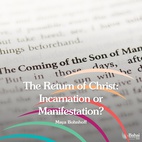
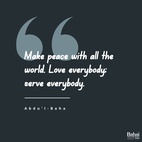




Comments
Sign in or create an account
Continue with Facebookor